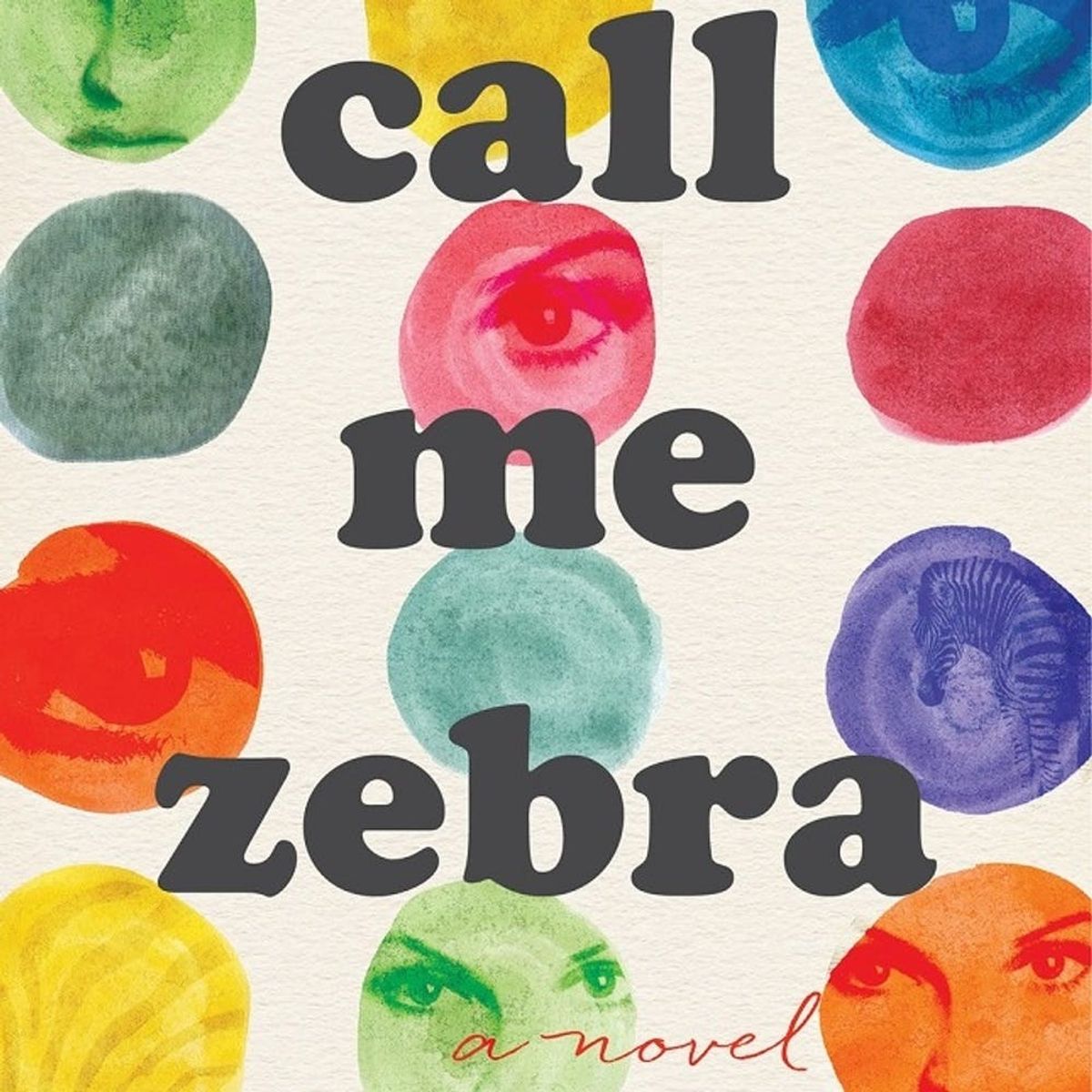Equality and quality fiction
Our Favorite Feminist Fiction of 2018

By Ilana LucasDec 23, 2018
Ilana Lucas
Ilana is an English professor, theatre consultant and playwright based in Toronto, Canada. When she’s not at the theatre or insisting that literary criticism can be fun, she’s singing a cappella or Mozart, occasionally harmonizing with the symphony, or playing “Under Pressure” with her rock handbell group, Pavlov’s Dogs.
2018 has been both an exciting and scary time to be a feminist. We’re making revolutionary strides in some ways, and fighting against some serious regression in our rights in others. The trailblazing works of feminist fiction published this year reflect this dichotomy, with heaps of hope balanced with a dash of dystopia. Brit + Co book club’s top 10 feminist novels of the past year would make a perfect gift basket for anyone who believes in equality — and in quality fiction.
<em>Red Clocks</em>
 Zumas’ novel envisions a world in which the US Congress passes the Personhood Amendment, making abortion illegal in all 50 states, as a fertilized egg now has equivalent rights to a post-birth human being. IVF is illegal too, as embryos can’t consent to it, and single parenthood is becoming a crime as well. That means if you’re unmarried and pregnant once the second law comes into place, your options become coupling or criminality. Ro, “The Biographer,” is this tale’s hero; single, she’s trying to get pregnant before the law is enacted. She also tells us the tale of a female polar explorer from the 19th century, whose less-constricting life parallels her own. If women try to escape to Canada, the “Pink Wall” forces the Canadian government to send them back to face charges. The chilling world featured in Red Clocks reminds us what we’re fighting for.
Zumas’ novel envisions a world in which the US Congress passes the Personhood Amendment, making abortion illegal in all 50 states, as a fertilized egg now has equivalent rights to a post-birth human being. IVF is illegal too, as embryos can’t consent to it, and single parenthood is becoming a crime as well. That means if you’re unmarried and pregnant once the second law comes into place, your options become coupling or criminality. Ro, “The Biographer,” is this tale’s hero; single, she’s trying to get pregnant before the law is enacted. She also tells us the tale of a female polar explorer from the 19th century, whose less-constricting life parallels her own. If women try to escape to Canada, the “Pink Wall” forces the Canadian government to send them back to face charges. The chilling world featured in Red Clocks reminds us what we’re fighting for.
<em>The Only Harmless Great Thing</em>
 Cruelty toward many marginalized groups is explored and juxtaposed in Bolander’s novel that both looks back to the early 1900s and forward to the future. The rights of women, the working class, and animals are linked in an alternative history that features two real stories: the death of Topsy, a “murdering” circus elephant who was executed by electrocution in a spectacle for invited guests, and that of the Radium Girls, female factory workers in New Jersey who died of radiation poisoning caused by the luminous paint they brushed onto watch dials. In Bolander’s version, partially narrated by Kat, a woman from the future who shows the effects of a hundred years of this story being told, Radium Girl Regan teaches an elephant how to perform the job instead. The book asks a vital question: How can we abandon cruelty entirely, instead of merely foisting it off on another group?
Cruelty toward many marginalized groups is explored and juxtaposed in Bolander’s novel that both looks back to the early 1900s and forward to the future. The rights of women, the working class, and animals are linked in an alternative history that features two real stories: the death of Topsy, a “murdering” circus elephant who was executed by electrocution in a spectacle for invited guests, and that of the Radium Girls, female factory workers in New Jersey who died of radiation poisoning caused by the luminous paint they brushed onto watch dials. In Bolander’s version, partially narrated by Kat, a woman from the future who shows the effects of a hundred years of this story being told, Radium Girl Regan teaches an elephant how to perform the job instead. The book asks a vital question: How can we abandon cruelty entirely, instead of merely foisting it off on another group?
<em>Circe</em>
 Miller follows up her Orange Prize-winning The Song of Achilles with this revamped and reoriented take on The Odyssey. Circe, best known as the witch who changed Odysseus’ men into pigs before falling for the man’s charms, tells her own story. Circe is a creature never before seen; not just a nymph, and ignored by both gods and man, she finds herself able to perform feats of witchcraft. This witchcraft is different from the powers of the gods and can affect them as well as humans. Since gods aren’t used to pain, her abilities terrify them. Circe is more and more interested in humanity, however, which proves to be fortuitous once the gods banish her. Through Miller’s feminist retelling of well-known myths, we get to see Circe take center stage in these epic foundational stories.
Miller follows up her Orange Prize-winning The Song of Achilles with this revamped and reoriented take on The Odyssey. Circe, best known as the witch who changed Odysseus’ men into pigs before falling for the man’s charms, tells her own story. Circe is a creature never before seen; not just a nymph, and ignored by both gods and man, she finds herself able to perform feats of witchcraft. This witchcraft is different from the powers of the gods and can affect them as well as humans. Since gods aren’t used to pain, her abilities terrify them. Circe is more and more interested in humanity, however, which proves to be fortuitous once the gods banish her. Through Miller’s feminist retelling of well-known myths, we get to see Circe take center stage in these epic foundational stories.
<em>The Red Word</em>
 Henstra invokes the Muses to start her novel, a mythical but modern story of rape culture and university. Karen Huls shies away from the word “rape” when it’s first suggested to her. The young woman from a small town in Ontario comes to in a daze on the lawn of Raghurst, the self-identified feminist residence for students at her Ivy League university. When the women of the house take her in and ask what really happened during her night at the Gamma Beta Chi frat party next door, she’s not entirely sure what to call it. Karen, desperate for acceptance and housing, soon finds herself ensconced in the Raghurst philosophy. Bold and passionate house leader Dyann soon vows to bring down the fraternity once and for all — but Karen now has feelings for one of the frat boys. Henstra’s novel thrives on discomfort and grey areas, dealing with difficult topics and refusing to create pure lines of good and evil.
Henstra invokes the Muses to start her novel, a mythical but modern story of rape culture and university. Karen Huls shies away from the word “rape” when it’s first suggested to her. The young woman from a small town in Ontario comes to in a daze on the lawn of Raghurst, the self-identified feminist residence for students at her Ivy League university. When the women of the house take her in and ask what really happened during her night at the Gamma Beta Chi frat party next door, she’s not entirely sure what to call it. Karen, desperate for acceptance and housing, soon finds herself ensconced in the Raghurst philosophy. Bold and passionate house leader Dyann soon vows to bring down the fraternity once and for all — but Karen now has feelings for one of the frat boys. Henstra’s novel thrives on discomfort and grey areas, dealing with difficult topics and refusing to create pure lines of good and evil.
<em>Call Me Zebra</em>
 Bibi Abbas Abbas Hosseini, the woman at the heart of Call Me Zebra, is its strength; unique, brilliant, introspective, and funny, her philosophical take on life is bound to inspire. When Bibi was a child, she fled the Iraq War with her father, a translator of literature who taught her to be a polyglot and voracious reader. Bibi is enamored with books; in fact, you could say that they’re her closest companions. Bibi is hiding herself in the canon of literature because her emigration was marked by horror and pain, making her intimately acquainted with death and hunger. A decade after she arrives in New York, her parents are dead, and she’s making a pilgrimage to Barcelona, the last city stop on her journey to America. The Italian philologist she meets there turns out to be more of an equal than a mentor, but in their affair, Bibi does get a chance to try living, and to decide whether she’d like to start making some human, rather than manuscript, connections.
Bibi Abbas Abbas Hosseini, the woman at the heart of Call Me Zebra, is its strength; unique, brilliant, introspective, and funny, her philosophical take on life is bound to inspire. When Bibi was a child, she fled the Iraq War with her father, a translator of literature who taught her to be a polyglot and voracious reader. Bibi is enamored with books; in fact, you could say that they’re her closest companions. Bibi is hiding herself in the canon of literature because her emigration was marked by horror and pain, making her intimately acquainted with death and hunger. A decade after she arrives in New York, her parents are dead, and she’s making a pilgrimage to Barcelona, the last city stop on her journey to America. The Italian philologist she meets there turns out to be more of an equal than a mentor, but in their affair, Bibi does get a chance to try living, and to decide whether she’d like to start making some human, rather than manuscript, connections.
<em>Vox</em>
 Another dystopian reimagining of current events, Vox takes on a different kind of restriction for women. Reverend Carl’s “Pure Movement” has seized control of the country, and women are no longer allowed to read or write. They can’t learn about scientific advancements or even hold a passport. Why would they want to leave, after all, when everything they have is provided to them by their own country? Worst of all is the final stricture: Women are limited to speaking 100 words a day. Their wristbands count down the words they have left, and any more than the limit results in increasingly painful shocks. Dr. Jean McClellan, a cognitive linguist forced into subservience to her husband and four children, is allowed to come out of retirement to assist the president’s brother after an accident. With her restrictions temporarily lifted, she can count her own blessings, or she can risk everything for a revolution. It’s up to her conscience to decide.
Another dystopian reimagining of current events, Vox takes on a different kind of restriction for women. Reverend Carl’s “Pure Movement” has seized control of the country, and women are no longer allowed to read or write. They can’t learn about scientific advancements or even hold a passport. Why would they want to leave, after all, when everything they have is provided to them by their own country? Worst of all is the final stricture: Women are limited to speaking 100 words a day. Their wristbands count down the words they have left, and any more than the limit results in increasingly painful shocks. Dr. Jean McClellan, a cognitive linguist forced into subservience to her husband and four children, is allowed to come out of retirement to assist the president’s brother after an accident. With her restrictions temporarily lifted, she can count her own blessings, or she can risk everything for a revolution. It’s up to her conscience to decide.
<em>Juno’s Swans</em>
 Wolff’s novel about a teenage love affair is set squarely in Reagan-era America, with the reverberations from pop culture, the Challenger disaster, and the AIDS epidemic forming the backdrop for an obsessive romance gone wrong. Nina and her best friend Titch are spending summer 1988 by themselves in Cape Cod, working at a catering hall and taking acting lessons before their final year of high school. Nina’s dysfunctional family (absent, dead, or suffering from dementia) and her previous relationship with a male high school theater teacher send her running into the arms of Sarah, the college student working as assistant acting coach. Nina’s coming of age is marked by the wild ups and downs of young love to the abandonment of all else, including friendship. The lessons she learns are difficult, but essential.
Wolff’s novel about a teenage love affair is set squarely in Reagan-era America, with the reverberations from pop culture, the Challenger disaster, and the AIDS epidemic forming the backdrop for an obsessive romance gone wrong. Nina and her best friend Titch are spending summer 1988 by themselves in Cape Cod, working at a catering hall and taking acting lessons before their final year of high school. Nina’s dysfunctional family (absent, dead, or suffering from dementia) and her previous relationship with a male high school theater teacher send her running into the arms of Sarah, the college student working as assistant acting coach. Nina’s coming of age is marked by the wild ups and downs of young love to the abandonment of all else, including friendship. The lessons she learns are difficult, but essential.
<em>The Naked Woman</em>
 This first English translation of Uruguayan writer Somers’ classic novel from the 1950s couldn’t be more timely. Rebecca Linke turns 30, and nothing happens — just like nothing has ever happened. Fed up with society’s standards and responsibilities, she escapes to her cottage in the country and symbolically cuts off her own head. Freed from her self-imposed prison of societal expectation, she returns to her village with a new name — Eve — and a naked soul and body. Her open displays of anger at the status quo and pleasure in herself are seen as daring and dangerous, and she earns herself the ire of both the status-conscious women and lustful and misogynistic men of her village. Living outside the system has consequences, says the book, but it can also be a wonderful thing.
This first English translation of Uruguayan writer Somers’ classic novel from the 1950s couldn’t be more timely. Rebecca Linke turns 30, and nothing happens — just like nothing has ever happened. Fed up with society’s standards and responsibilities, she escapes to her cottage in the country and symbolically cuts off her own head. Freed from her self-imposed prison of societal expectation, she returns to her village with a new name — Eve — and a naked soul and body. Her open displays of anger at the status quo and pleasure in herself are seen as daring and dangerous, and she earns herself the ire of both the status-conscious women and lustful and misogynistic men of her village. Living outside the system has consequences, says the book, but it can also be a wonderful thing.
<em>The Book of Dog</em>
 It’s a feminist apocalypse in Benobi’s book about a yellow chemical agent that pervades the air and turns people (women, especially) into animals with human brains. It’s a metaphor for the lack of power women have in a world seemingly hell-bent on destroying itself via political insanity, unchecked violence, and climate change. Six women are the last line of defense before total collapse. Two have been turned into animals, a bear and a dog, and one is pregnant with the child of the Beast. All of them, diverse as they are in background and temperament, are determined, badass heroines, and cement their bonds as a stellar team.
It’s a feminist apocalypse in Benobi’s book about a yellow chemical agent that pervades the air and turns people (women, especially) into animals with human brains. It’s a metaphor for the lack of power women have in a world seemingly hell-bent on destroying itself via political insanity, unchecked violence, and climate change. Six women are the last line of defense before total collapse. Two have been turned into animals, a bear and a dog, and one is pregnant with the child of the Beast. All of them, diverse as they are in background and temperament, are determined, badass heroines, and cement their bonds as a stellar team.
<em>Hazards of Time Travel</em>
 One final dystopia for you: In another take on the downfall of the United States, questioning authority has immediate, severe consequences; skin tone determines your class (officially, instead of just tacitly); Execution Hours are required family viewing; and the punishment worse than execution is to be “Disappeared,” erased from existence and speech. A more creative punishment involves the time travel of the title; a willful woman may get sent to the past to a kind of historical re-education camp in order to learn obedience. This is the fate that befalls high school valedictorian Adriane Strohl when her graduation speech is seen as too controversial. Sent back to a women’s college in 1950s Wisconsin, Adriane’s task is clear: Learn to become the 1950s feminine ideal, or disappear. Adriane, however, has other plans, and with the assistance of a psychology professor who might be a fellow time traveler, she has the potential to change the past — and the future.
One final dystopia for you: In another take on the downfall of the United States, questioning authority has immediate, severe consequences; skin tone determines your class (officially, instead of just tacitly); Execution Hours are required family viewing; and the punishment worse than execution is to be “Disappeared,” erased from existence and speech. A more creative punishment involves the time travel of the title; a willful woman may get sent to the past to a kind of historical re-education camp in order to learn obedience. This is the fate that befalls high school valedictorian Adriane Strohl when her graduation speech is seen as too controversial. Sent back to a women’s college in 1950s Wisconsin, Adriane’s task is clear: Learn to become the 1950s feminine ideal, or disappear. Adriane, however, has other plans, and with the assistance of a psychology professor who might be a fellow time traveler, she has the potential to change the past — and the future.
The Latest
Make Your Inbox Your Happy Place
Get freebies, inspo, & more delivered to you.



















